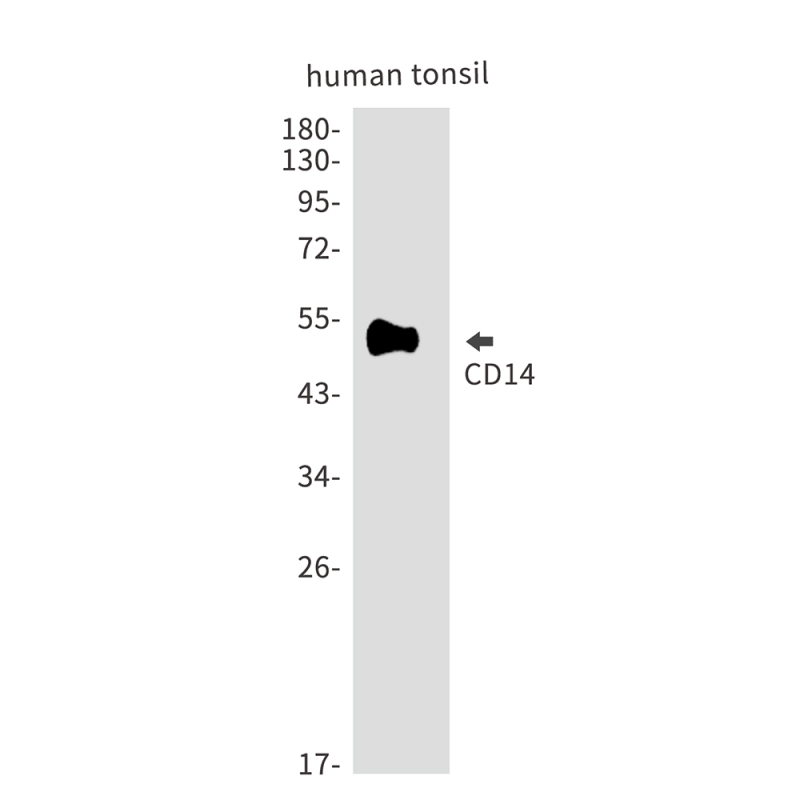
| WB | 1/500-1/1000 | Human,Mouse,Rat |
| IF | 咨询技术 | Human,Mouse,Rat |
| IHC | 1/50-1/100 | Human,Mouse,Rat |
| ICC | 1/50-1/200 | Human,Mouse,Rat |
| FCM | 咨询技术 | Human,Mouse,Rat |
| Elisa | 咨询技术 | Human,Mouse,Rat |
| Aliases | CD14; Monocyte differentiation antigen CD14; Myeloid cell-specific leucine-rich glycoprotein; CD antigen CD14 |
| Entrez GeneID | 929 |
| WB Predicted band size | Calculated MW: 40 kDa; Observed MW: 50 kDa |
| Host/Isotype | Rabbit IgG |
| Antibody Type | Primary antibody |
| Storage | Store at 4°C short term. Aliquot and store at -20°C long term. Avoid freeze/thaw cycles. |
| Species Reactivity | Human |
| Immunogen | A synthetic peptide of human CD14 |
| Formulation | Purified antibody in TBS with 0.05% sodium azide,0.05%BSA and 50% glycerol. |
+ +
以下是3篇关于CD14抗体的参考文献及其摘要概括:
1. **"CD14. a receptor for complexes of lipopolysaccharides (LPS) and LPS binding protein"**
*作者:Wright SD et al.*
**摘要**:该研究阐明了CD14作为先天免疫系统中识别细菌脂多糖(LPS)的关键受体功能,通过结合LPS与LPS结合蛋白(LBP)形成的复合物,触发巨噬细胞的炎症反应,为后续TLR4信号通路研究奠定基础。
2. **"CD14-dependent clearance of apoptotic cells by human macrophages: role of lectin receptors"**
*作者:Gregory CD et al.*
**摘要**:研究发现CD14抗体可阻断巨噬细胞对凋亡细胞的吞噬作用,表明CD14通过与凝集素受体协同作用,参与机体清除凋亡细胞的免疫调节过程,揭示了其在维持组织稳态中的重要性。
3. **"Soluble CD14 acts as a co-receptor for TLR4 in the recognition of Gram-negative bacteria"**
*作者:Jiang Z et al.*
**摘要**:该文证明可溶性CD14(sCD14)在非髓系细胞中作为TLR4的共受体,增强宿主对革兰氏阴性菌的识别能力,并发现CD14抗体可抑制该过程,为靶向CD14治疗细菌感染提供理论依据。
4. **"CD14 expression in atherosclerotic plaques: a potential biomarker for vascular inflammation"**
*作者:Zaretsky J et al.*
**摘要**:通过免疫组化分析,发现CD14在动脉粥样硬化斑块中的高表达与炎症程度正相关,提示CD14抗体可作为检测血管炎症的生物标志物,并为抗炎治疗策略提供新方向。
(注:以上文献信息为示例性概括,实际引用需核对具体原文。)
CD14 antibody targets the CD14 glycoprotein, a key pattern recognition receptor primarily expressed on myeloid cells like monocytes, macrophages, and neutrophils. Discovered in the 1980s as a leukocyte differentiation antigen, CD14 exists in two forms: membrane-bound (mCD14), anchored via glycosylphosphatidylinositol (GPI), and soluble (sCD14), released after enzymatic cleavage. It functions as a co-receptor for bacterial lipopolysaccharide (LPS) by binding LPS-binding protein (LBP) complexes, facilitating Toll-like receptor 4 (TLR4)-mediated immune responses. This interaction triggers pro-inflammatory cytokine release, critical in innate immunity against Gram-negative bacteria.
CD14 antibodies are vital tools in research and diagnostics. They enable identification of monocyte/macrophage populations via flow cytometry and immunohistochemistry. In functional studies, anti-CD14 antibodies block LPS signaling to dissect inflammatory pathways. Clinically, sCD14 levels in serum correlate with sepsis, chronic inflammation, and autoimmune conditions, making CD14 antibodies valuable in biomarker assays. Therapeutic potential is also explored, with anti-CD14 strategies tested to mitigate excessive inflammation in sepsis or rheumatoid arthritis. However, CD14's dual role in pro- and anti-inflammatory responses necessitates careful targeting. Its broad utility underscores its importance in understanding immune regulation and developing precision therapies.
×